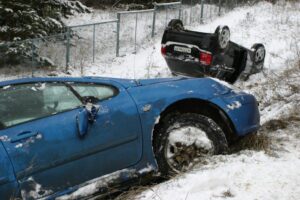
After a car accident, you should first make sure everyone is safe, call 911, and then take steps to protect your health, legal rights, and insurance claim. Car accidents are overwhelming, whether it’s a minor fender-bender or a serious crash.
In the moments that follow, your actions can greatly affect your safety, health, and legal rights. Are you asking yourself, “What should you do after a car accident?” Hire an Atlanta car accident lawyer for more help.
1. Prioritize Safety and Call 911
Your first priority after any car accident is safety. Check yourself and others for injuries and move to a safe location if possible, such as the shoulder of the road. If anyone is injured or if there’s significant property damage, call 911 immediately to report the accident and request medical help.
Even in seemingly minor crashes, it’s best to have law enforcement document the incident. A police report can provide an official record of the accident, which is often essential for insurance claims and any legal action. Avoid moving your vehicle unless it’s creating a hazard or instructed by police to do so.
Get the strong arm
2. Exchange Information With the Other Driver
After making sure everyone is safe and medical help is on the way (if needed), exchange information with the other driver. Be sure to collect the following details:
- Full name and contact information
- Driver’s license number
- Insurance company name and policy number
- Vehicle information
Remain calm and cooperative, but do not admit fault or make statements that could be used against you later. Keep the conversation limited to the necessary exchange of details. If there are witnesses nearby, ask for their names and contact information as well.
3. Document the Scene Thoroughly
Accurate documentation is one of the most powerful tools in protecting your rights after a car accident. Use your phone to take clear photos of the vehicles, damage, skid marks, road conditions, traffic signs, and any injuries. Photograph both wide shots and close-ups from multiple angles.
If you can, write down or use a notes app to record the time, date, location, weather, and any observations about how the accident occurred. These details may be forgotten quickly but can be crucial when filing a claim or dealing with insurance companies.
4. Seek Medical Attention Immediately
Even if you feel fine, it’s important to get a medical evaluation as soon as possible after the accident. Some injuries—like whiplash, concussions, or internal bleeding—don’t show immediate symptoms but can worsen over time. Delaying treatment can harm your health and weaken your legal claim.
Make sure to follow through with all recommended treatments and keep records of doctor visits, prescriptions, and medical bills. These documents will help support your personal injury claim and show the true extent of your damages.
5. Notify Your Insurance Company
Contact your insurance company to report the accident as soon as you can. Be honest and stick to the facts, but don’t speculate about who was at fault or how severe your injuries might be. Let the investigation and your attorney handle those details.
Depending on your policy, you may be required to report the accident within a specific time frame to qualify for coverage. Providing prompt notice helps protect your right to any benefits under your auto insurance policy, including potential coverage for vehicle damage or medical payments.
6. Avoid Talking to the Other Driver’s Insurance Company
Shortly after the accident, the other driver’s insurance company may contact you for a statement. You are not obligated to speak with them—and it’s often in your best interest not to. Their goal is to minimize what they pay out, and anything you say can be used to reduce or deny your claim.
If you are contacted, politely decline to comment and inform them that your attorney will be in touch. Speaking to a legal professional first ensures your rights are protected and you don’t say something that could hurt your case.
7. Keep a File of All Accident-Related Records
Organization matters when it comes to handling a car accident claim. Create a file—digital or physical—where you keep all accident-related documents. This should include:
- Police reports
- Medical records and bills
- Repair estimates
- Correspondence with insurance companies
- Photos and witness information
Having everything in one place will make it much easier to share information with your attorney and respond to any requests from insurance adjusters. It also helps ensure you’re not leaving money on the table when it’s time to settle your claim.
8. Speak to an Experienced Car Accident Attorney
Hiring an experienced car accident lawyer can make a significant difference in your recovery—financially and emotionally. A legal professional can help you face insurance claims, gather evidence, prove liability, and negotiate for the full compensation you deserve.
An attorney understands the legal process and can protect you from lowball settlement offers, insurance delays, and other tactics designed to wear you down. The sooner you involve a lawyer, the more effectively they can protect your rights and build a strong case on your behalf.
9. Know What You May Be Entitled To
After an automobile accident, you may be eligible for compensation beyond just vehicle repairs. Depending on the circumstances, you could recover damages for:
- Medical bills and future medical care treatment
- Lost wages or reduced earning capacity
- Pain and suffering
- Emotional distress
- Property damage
A personal injury lawyer will assess all aspects of your case and determine what types of compensation you may be entitled to. This ensures you’re not settling for less than what you need to fully recover from your injuries and losses.
Get a Free Consultation with John Foy & Associates Today
Now you know what you should do after a car accident. Knowing what to do after a car accident can be scary—but we’re here to help. At John Foy & Associates, we’ve been helping accident victims for over 20 years.
If you’ve been hurt in a crash, don’t wait to get help for your personal injury lawsuit. Contact us today for a 100% FREE consultation. Let the Strong Arm handle your case while you focus on healing. Visit our FAQ page to learn more.
(404) 400-4000 or complete a Free Case Evaluation form





